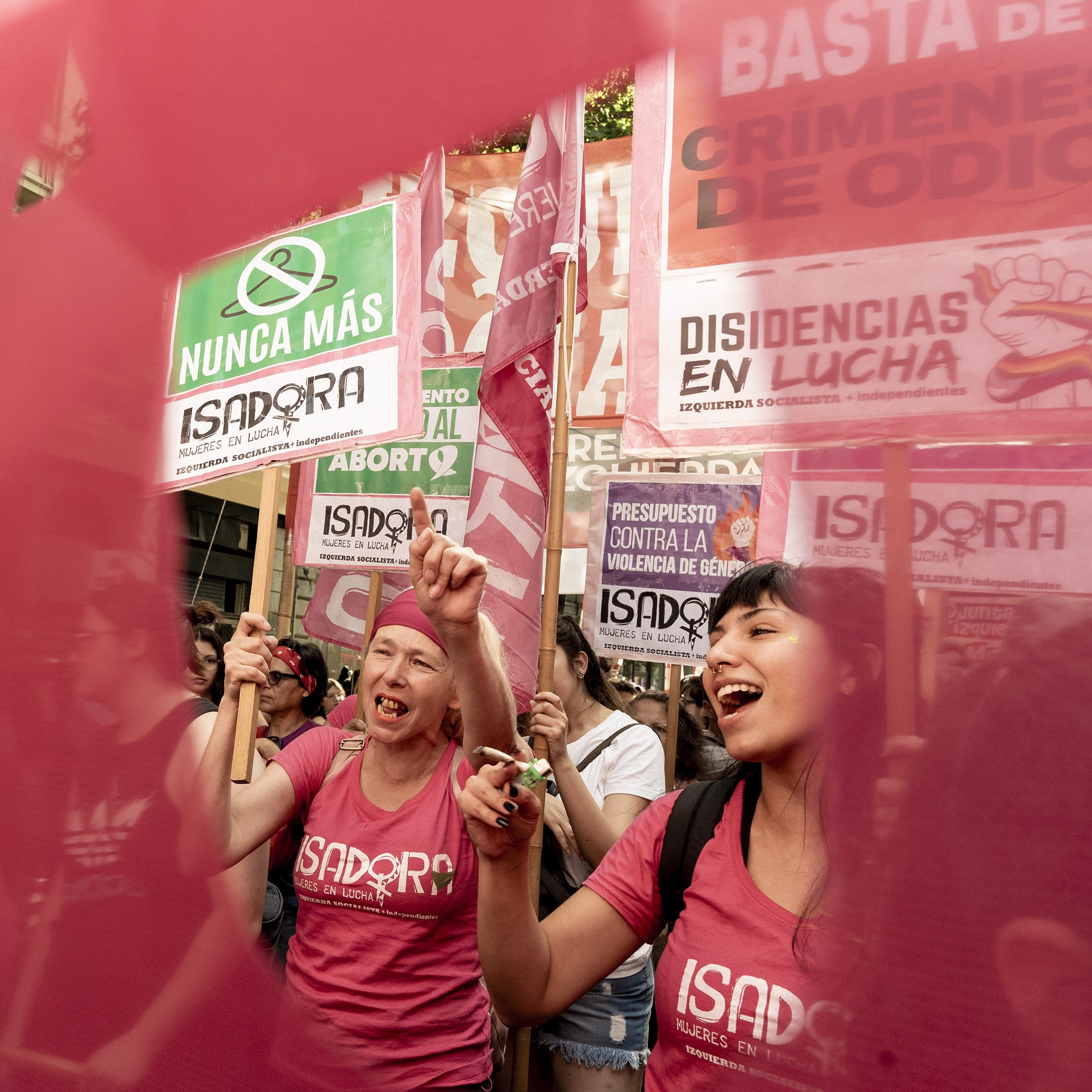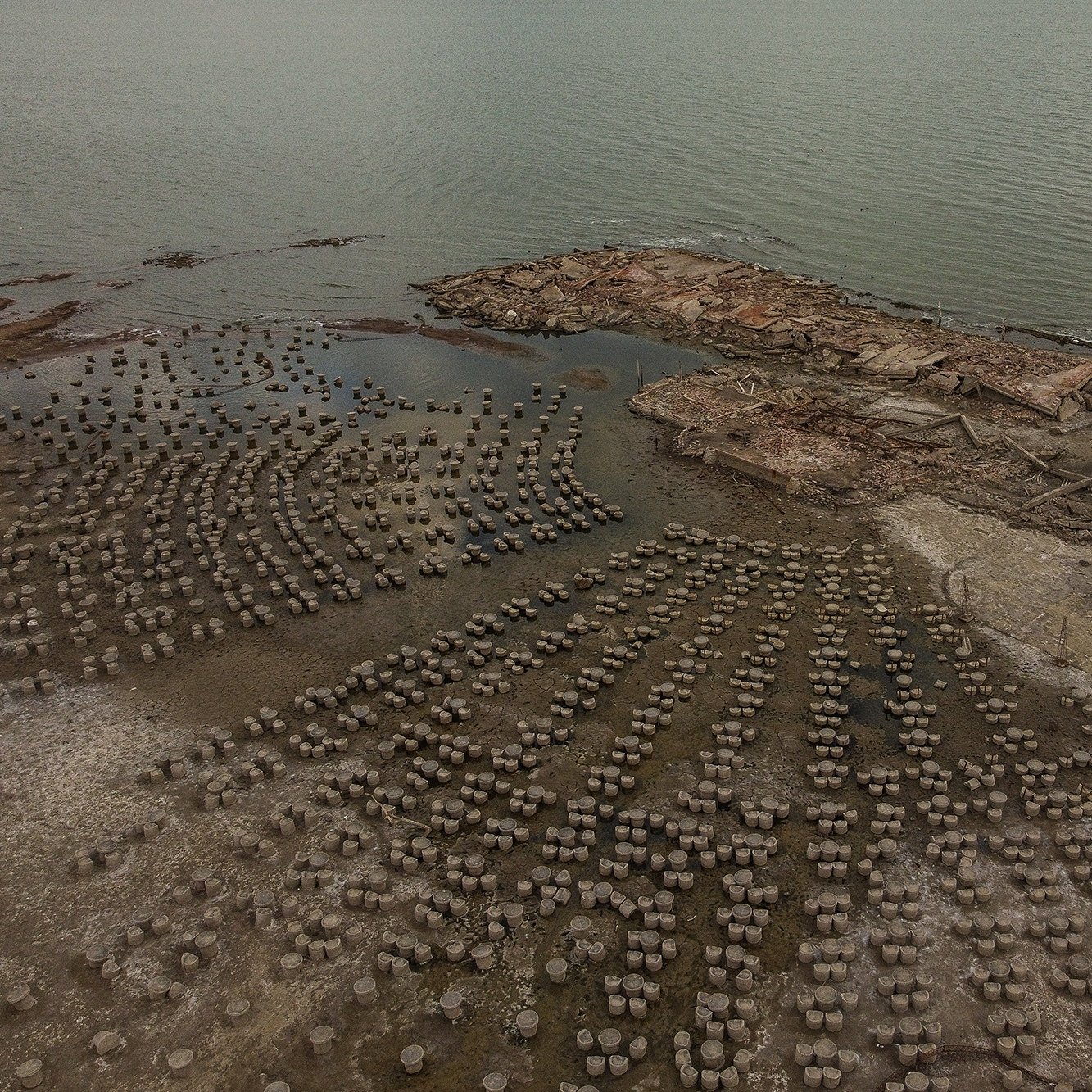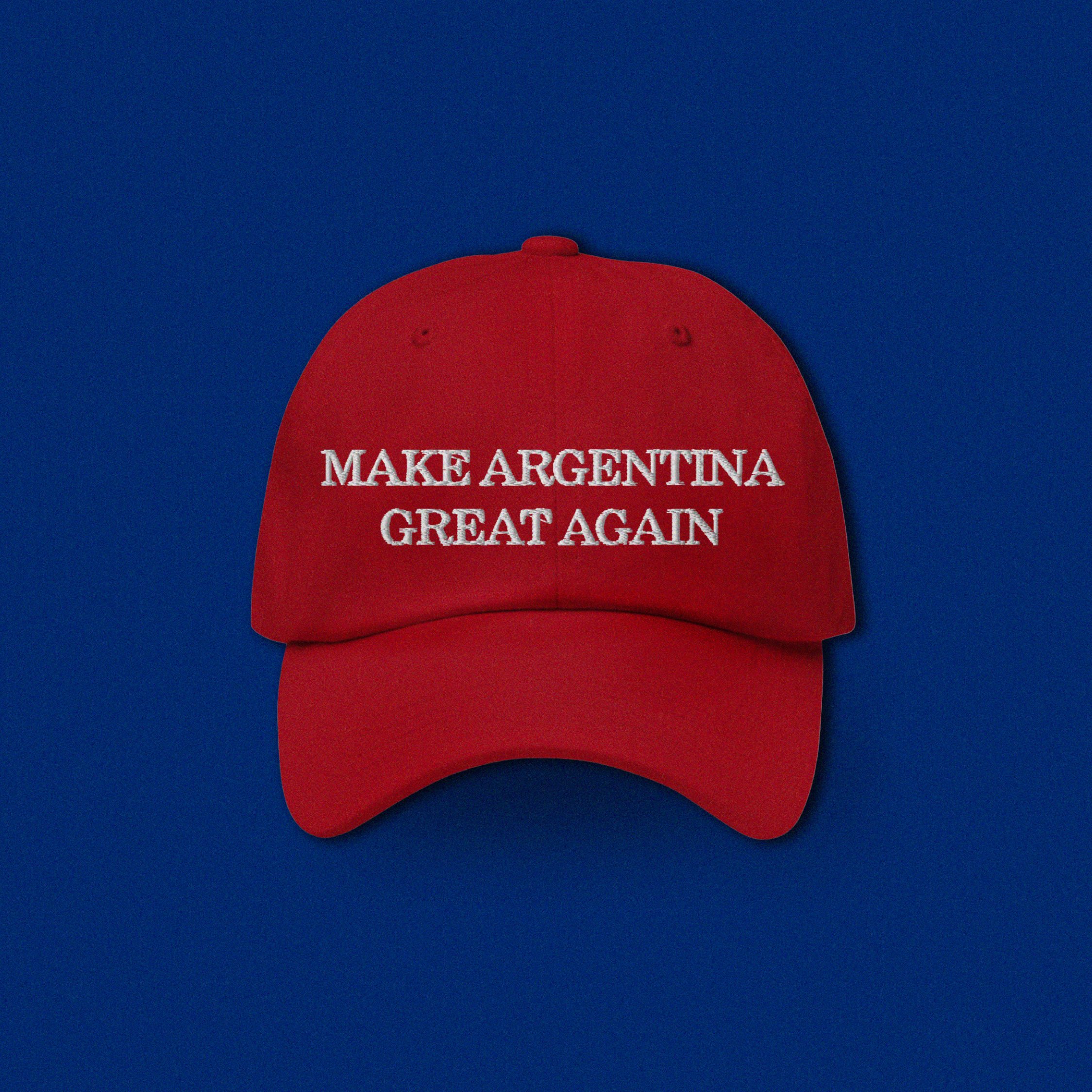What Argentina Sees in Trump
The country’s far right found a model in the former U.S. president.
OCTOBER 3, 2024
José Derman decided to repurpose his family’s home in La Plata, the capital of the Buenos Aires province, shortly after his mother passed away in 2020. He emptied the house, sold her old clothes and books, and painted the walls. With the help of two “comrades,” the house soon became the Kyle Rittenhouse Cultural Center, named after a white supremacist in the United States who shot three people at a protest against the police shooting of a Black man in 2020. A portrait of Rittenhouse adorns one of the inside walls, next to murals of Javier Milei, now Argentina's president but at the time a new far-right political figure, and former President Donald Trump, among others.
Derman and his team started by organizing anti-quarantine protests, then attacked and threatened the headquarters of the leftist party Izquierda Socialista in La Plata. “We wanted to provoke them,” Derman told me in an interview. “To break the monopoly of expression in the hands of Marxism and feminism.” They also took part in protests to support so-called “victims of censorship” — far-right activists who have been sued for hate speech by politicians in recent years.
The plan for the cultural center was to attract more members and host weekly activities, workshops and meetings. But in September 2022, Derman faced a police investigation after he posted a video praising an assassination attempt on then-Vice President Cristina Kirchner, a progressive politician, and called for an armed rebellion “to put an end to communism.” The center was raided by the police and, ultimately, shuttered.
As with Trump, incendiary speech, radical proposals and an avid online following made Milei’s presidential victory possible.
Derman’s hatred of progressive politicians is extreme, and there are few Argentinians who would sympathize with his call for a violent overthrow of the political establishment. But the 40-year-old’s story is also part of a broader backlash against left-wing politics that has quietly taken hold in Argentina, largely fueled by those who feel left behind by progressive policies — and have found a model for rebellion in Donald Trump and his supporters.
This rebellion has turned out to be hugely successful in Argentina, too. In November 2023, a year after the center was shut down, Milei — a self-described anti-establishment politician who espouses many of Trump’s tactics and ideas — came to power with over 55 percent of votes.
At Milei’s rallies, supporters wore “Make Argentina Great Again” shirts and caps, and vendors sold Gadsden flags — an American Revolution-era flag that became associated with right-wing populism and strong anti-government sentiment. These have become regular fixtures at Milei’s public events now that he is president.
That embrace of right-wing populism as modeled by the United States is here to stay, whether or not Trump wins reelection in November. Agustín Baletti, a student and streamer, had a Make America Great Again cap long before Milei’s campaign rallies; now he has bought one that replaces “America” with “Argentina.” “MAGA was here long before Milei,” he said. “But he’s strengthening it.”
For Derman, too, the U.S.’s November result is less important than the trajectory of Milei’s government. “I keep fighting for my ideas,” Derman told me. “Especially now there’s a government that’s boosting them.”
✺
A libertarian economist and television personality, Milei helped found La Libertad Avanza (Liberty Advances) in 2021. His party went on to win two seats in the Chamber of Deputies, the lower chamber of the National Congress, that same year. By 2023, Milei had become popular enough to run — and win — a presidential race.
As with Trump, incendiary speech, radical proposals and an avid online following made Milei’s presidential victory possible. Milei tapped into widespread discontent with the traditional political system in his campaign, striking a chord with voters disillusioned by years of economic instability and perceived government failures. His platform was defined by bold promises: He vowed to dollarize the Argentine economy, dismantle the central bank, and do away with market intervention.
Although many of these pledges remain unfulfilled, they underscore Milei’s radical vision for Argentina. Since taking office, the government has eliminated a number of public institutions aimed at protecting women, LGBTQ+ communities and minorities. Government officials appointed by Milei have disputed gender equality policies, defended the right to bear arms, enforced police repression against pensioners and workers protesting the government, shut down national news agencies and taken other measures to counter previous left-wing policies — now deemed examples of “socialist” or “communist” ideology.
In a recent Congressional hearing, where he was called to discuss the closure of an office dedicated to preventing gender-based violence, Justice Minister Mariano Cúneo Libarona told lawmakers that the government rejected sexual and gender diversity as a “subjective invention” and “not aligned with biology.”
“President Milei entrusted us all with a cultural battle to recover freedoms and rights of the people,” he added, noting that voters had chosen to end a “disastrous period plagued with gender hypocrisy.”
His strident anti-establishment ideas tapped into a broader movement of right-wing populism gaining traction around the world — a connection he sought by cultivating a political persona that mirrored Trump’s.
These are drastic changes in a country that, not long ago, was considered a bastion of progressive politics. Argentina led Latin America — and sometimes the world — on a number of social issues: It legalized same-sex marriage in 2010; passed a law in 2012 allowing transgender people to register their IDs with their chosen gender; legalized abortion in 2020; and nurtured the region’s largest feminist movement protesting the murder of young women under the “Ni Una Menos” (“Not One Less”) banner.
But as Milei made inroads into politics, there was also increasingly fertile ground for populist speech in Argentina. The country’s chronic problem with inflation seemed unstoppable in 2023, with a staggering 211 percent price rise over 12 months. Daily life had become increasingly difficult, and voters were eager for new solutions. Milei, who had no experience in public office but had written books about the economy inspired by U.S. economists like the libertarian Murray Rothbard, promised to deliver economic growth by slashing state spending and waging a cultural battle against the left.
His strident anti-establishment ideas tapped into a broader movement of right-wing populism gaining traction around the world — a connection he sought by cultivating a political persona that mirrored Trump’s. He has consistently praised Trump’s administration, and he stood by Trump’s claims of fraud after the 2020 election.
“Donald Trump changed everything,” said Iñaki Gutiérrez, a 23-year-old influencer and university student who worked on Milei’s presidential campaign. Together with his girlfriend, Eugenia Rolón, he crafted Milei’s social media presence, drawing inspiration from what he called Trump’s “absolute honesty.” The couple now manage Milei’s TikTok account, where the president speaks directly to his followers about his economic views and about everyday life in the government.
A recent poll found that nearly one-third of Argentinians maintain a positive view of Donald Trump, while roughly the same number said they would support Kamala Harris. But the symbols and rhetoric of Trump’s Make America Great Again (MAGA) movement have proved more resonant for Argentinian politicians than those of Harris’s campaign. Lawmakers and supporters of Milei’s La Libertad Avanza party, for example, praised Trump in real time on social media during his debate with Kamala Harris in September, while progressive parties did not comment on the debate or publicly endorse Harris’ views.
A common refrain among Trump supporters in Argentina is that the former U.S. president is a powerful man who defends the interests of his country. “He’s not scared when it comes to making decisions,” said Alexis Salinas, 23, a firefighter in Buenos Aires. “Trump’s biggest virtue is discipline, and he’s not just a president, he’s a world leader.”
According to Salinas, the U.S. is in decline because “progressive politics” have “invaded and sickened” the minds of citizens. “They’re stepping away from values that made the U.S. great.”
When Milei and Trump met in person for the first time in February 2024, during a Conservative Political Action Conference in the United States, Argentina’s president struggled to speak. “President, president,” he stammered. “I’m very happy; you’re very generous with me,” he said. Smiling as he hugged him, Trump responded, “You’re doing a great job. MAGA, Make Argentina Great Again.”
Since then, Trump has said Argentina “went MAGA,” praised Milei’s administration and called him a “big Trump guy.” At a public event in Buenos Aires in September — organized by Spain’s far-right party Vox and attended by a head of the Heritage Foundation — Milei said he and Trump are “the most relevant politicians on earth.”
A Trump presidency could offer Milei greater access to an ecosystem of influential business figures and champions of a liberalized, deregulated world that Milei is eager to court.
For Milei, a second Trump term could mean a powerful ally in the White House — something that might be particularly useful now that the country faces the challenge of paying back over $40 billion in debt to the International Monetary Fund as foreign investors shy away from Argentina.
But a number of analysts in Argentina and the U.S. argue that it is unrealistic to expect much attention from Trump if he secures the White House. U.S. foreign policy is focused on ongoing conflicts in the Middle East and in Ukraine, and its policy toward Latin America is centered on dissuading migrants from attempting to reach the U.S.
Even so, a Trump presidency could offer Milei greater access to an ecosystem of influential business figures and champions of a liberalized, deregulated world that Milei is eager to court. Since taking office last December, the Argentinian president has traveled 14 times, spending over $300,000 of public funds in primarily personal and private meetings with U.S. business giants, including Elon Musk, Mark Zuckerberg, Jeff Bezos and Sam Altman. Milei has framed these trips as part of a new policy to showcase Argentina as a deregulated land of investment, ready to welcome foreign corporations — particularly from the U.S.
In late September, during his attendance to the U.N. General Assembly, Milei rang the opening bell of the Wall Street Stock Exchange and met with Musk for a third time in six months. His government proudly shared photos of the event on social media, claiming Argentina was finally back on the international stage.
On none of these occasions did Milei meet with President Joe Biden. Over the past year, diplomatic ties between Argentina and the U.S. have been cordial, if distant: While Milei has clashed with other antagonist presidents across the world — like Pedro Sánchez, from Spain, who he accused of being “corrupt” — he has not directly attacked Biden, regardless of their ideological differences. If elected, Harris is likely to pursue a similarly practical and polite relationship, seeking to keep Argentina on side and away from China’s sphere of influence, but making no efforts to further deepen relations.
Gutiérrez, Milei’s TikTok manager, is gunning for a Trump victory, which he said would lead to “a wonderful relationship” between the leaders of the two countries. But regardless of the outcome of the election, Gutiérrez expects Trump to continue to influence Argentina through the voice of Milei. “Trump says things without any nuances or veils … just the way it is,” he said.
Listening to Milei, it’s impossible not to think of Trump: the boasting, the exaggeration, the ego are uncannily familiar.
Milei introduced his 2025 budget to Congress in September, proudly announcing it will focus on achieving “zero deficit” by slashing the state's spending. “We’ve done the biggest adjustment in the history of humanity,” he said, referring to his nine months in office. Maybe Trump would have added that no one had ever seen anything like it.




